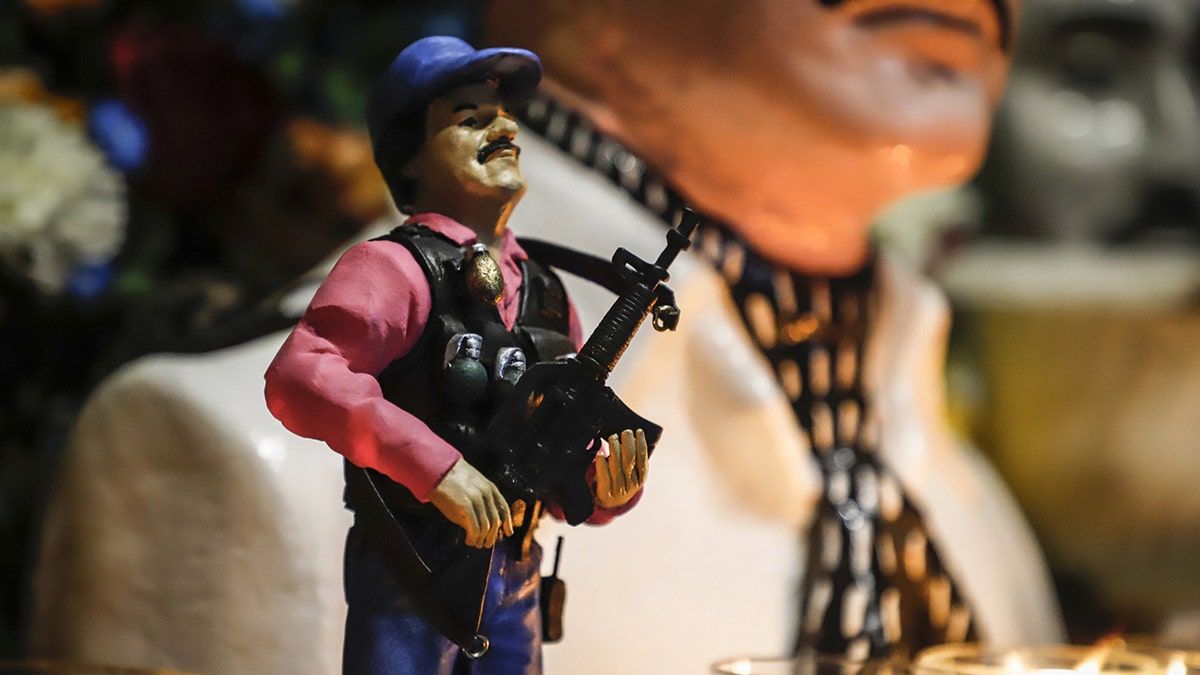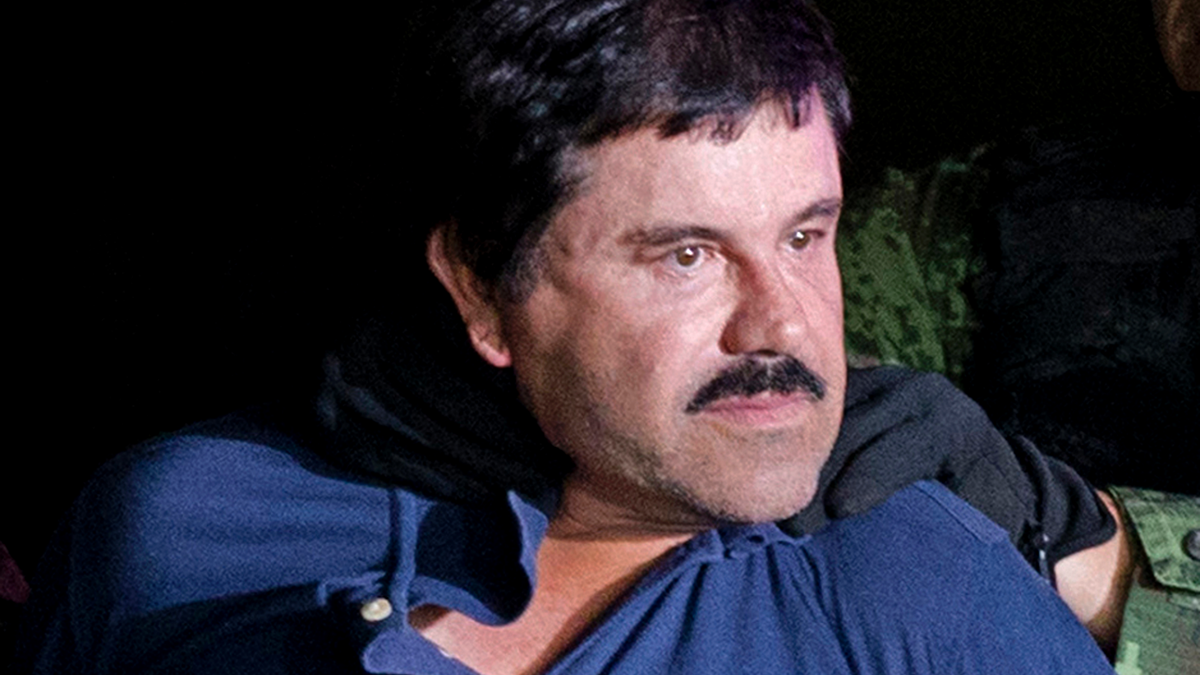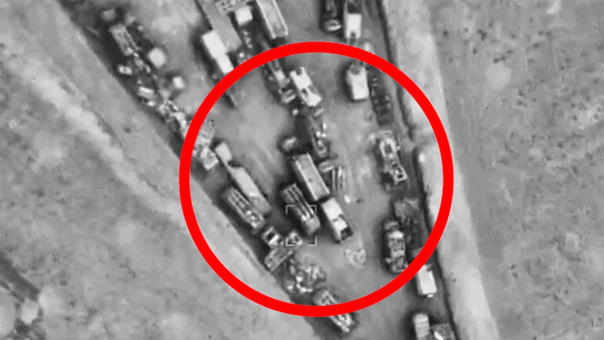
A statue of Mexican drug lord Joaquin "El Chapo" Guzman, is displayed for sale near a bust of narco-saint Jesus Malverde, at his chapel in Culiacan, Sinaloa state in northwest Mexico on Feb. 19. (Photo by RASHIDE FRIAS / AFP) (Photo credit should read RASHIDE FRIAS/AFP/Getty Images)
The action figure boasts a bullet-proof vest, four hand grenades, and a rifle strapped to his back. The T-shirts bear his image.
Hats are emblazoned with his initials, JGL, and the number 701 – which everyone in town recognizes as his rank on a Forbes Magazine list of the world’s wealthiest people.
They are all Joaquin “El Chapo” Guzman collectibles, and they’re flying off the shelves in his hometown of Badiraguato, in the Mexican state of Sinaloa, as fast as they’re being restocked.
Anything associated with the convicted drug lord has become a must-have in the town and its environs since El Chapo, 61, was convicted last week in a federal court in New York of drug trafficking and running an industrial-scale smuggling operation. His three-month trial was packed with Hollywood-style tales of grisly killings, political payoffs, cocaine hidden in jalapeno cans, jewel-encrusted guns, and a naked escape with his mistress through a tunnel.
The stories from the trial seem to have only boosted interest in Chapo memorabilia. Which is perhaps no surprise in stores run by a chapel devoted to Jesus Malverde, a folkloric Robin Hood-type figure that became a patron saint of cartel leaders in Sinaloa state.
Efe, a Spanish wire service, described Malverde as a figure many poor residents in the area revere because of the legend about how he protected the indigent and powerless.
TWO SONS OF 'EL CHAPO' INDICTED ON DRUG CONSPIRACY CHARGES, REMAIN FUGITIVES
Local residents have been streaming to the chapel since El Chapo’s conviction to pray for him, or give thanks to the help he gave the poor in the region, according to Efe.
“Because of what’s happening to him, many people are now coming to ask (Malverde) to give (El Chapo) peace of mind," said Jesus Gonzalez, who runs the chapel, "to give him the strength to endure everything that’s happening. Many, many people have come. You see lots of candles with his name on pieces of paper. The people come and thank him for his favors and also pray for El Chapo."
Local folks know well all the crimes that have landed El Chapo in jail and in headlines worldwide.

Joaquin "El Chapo" Guzman is made to face the media in Mexico City as he is escorted by Mexican soldiers following his recapture six months after escaping from a maximum security prison. The notorious Mexican drug lord was convicted of drug-trafficking charges, Tuesday, Feb. 12 2019, in federal court in New York. (AP Photo/Eduardo Verdugo, File)
But many here have told reporters over the years that they knew another side of the man who witnesses at trial said had himself engaged in killings. That was one side of the man who provided the extremely poor with help and opportunities that the government many describe as corrupt and indifferent did not.
“The drug dealers do more for the people than the government does,” a 2015 New York Times article quoted Eric Reyes, a systems engineer from Mexico City, as saying to explain the reverence for Guzman. “If you live in a dealer’s territory he treats you well. The government won’t do anything for you. It’s all bureaucracy and red tape.”
Adrián Cabrera, a blogger in Culiacán wearing a black T-shirt with a picture of El Chapo, told the Times: “Why do people admire him? Because he’s a living legend. He’s like Al Capone. He’s like Lucky Luciano. Like Tony Soprano. Like Scarface. He’s like a character on a television show, except that he’s alive, he’s real.
The stores run by the chapel, which is a source of consternation for the country’s Catholic leadership, sell such things as “narco bingo,” where the cards have the images of some of the most notorious drug leaders.
Many residents say they feel more loyalty to El Chapo than to any religious figure, noting he built schools and provided assistance to the community, including to marijuana growers.
One of El Chapo’s attorneys, Mariel Colon Miro, told Fox News she is not surprised by the clamor in Mexico for El Chapo collectibles. She said that while representing him and getting to know his relatives, she learned about all that he did for the poor of his hometown.
“He’s a very humble and kind person,” Colon said. “He’s dedicated to the people of his town. People there don’t see him the same way the media paints him, as a monster.”
CLICK HERE TO GET THE FOX NEWS APP
“He was a like a philanthropist, based on the conversations I had with his family,” she said.
Asked about the prosecution’s accusation Guzman had been involved in dozens of murders, Colon said the allegations were based on accounts by unsavory witnesses.
“I wasn’t there. You weren’t there,” Colon said. “We know this from witnesses who themselves had committed heinous crimes and admitted to them and had ample opportunities to lie for their own benefit.”
In the meantime, Mexican President Andres Manuel Lopez Obrador has been trying to reassure the people of Guzman’s old stomping ground that they can rely on the government to improve living conditions.
He visited Guzman’s birthplace last week, and spoke to residents about the importance of addressing the poverty in Mexico and announced a plan to lift Badiraguato, with such things as a new highway, new trees and a public university.








































